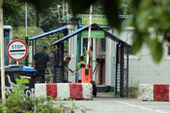
Abkhazia closes Enguri Bridge crossing-point
By Nika Gamtsemlidze
Monday, July 1
The crossing of the Enguri Bridge is unilaterally closed. People can no longer cross the so-called border between occupied Abkhazia and Georgia, only those who have so-called Abkhazian passport or a special invitation can cross the Enguri Bridge.
The de-facto Parliament initiated the decision on a sitting of June 25, and the appeal was sent to the de-facto president. According to the Public Broadcaster, the reason behind this was the statement of Akaki Bobokhidze, member of the Georgian Parliament, towards the Russian MP, Gavrilov.
As Bobokhidze said, Raul Khajimba, the de-facto president of Abkhazia, is “playing to be a president.”
“Khajimba has nothing to do with my statements, but I confirm that I made some harsh statements and I told Gavrilov: ‘I have been killing you and will kill you in the future,’ by which I meant that I have been fighting against occupation and I am ready to fight in future as well,” said Bobokhidze with the media.
According to the State Minister for Reconciliation and Civic Equality, Ketevan Tsikhelashvili, the main priority for her is to take care of the interests of those who are suffering the most because of these illegal restrictions.
“In this regard, I know that one of the most difficult challenges and concerns of our population is the movement of young people for participating in the national exams. We work together with the Ministry of Education to help the students from breakaway regions to have access to higher education in the Georgian controlled territory,” noted Tsikhelashvili.
As she said, every decision will be made according to the demand of the population, and everything will be done to “end this illegal limitation shortly.”
The Ministry of Foreign Affairs of Georgia published a special statement regarding this issue, according to the Minister, David Zalkaliani, Georgia will raise the issue of closure of the occupation line in Abkhazia region at the next round of the Geneva International Discussions.
“We find this situation as unacceptable for us; the right to free movement is being restricted. We will call upon the Russian Federation within the framework of the next round of the Geneva International Discussions to act constructively and allow people to move freely, which they need, first of all, for humanitarian purposes. I refer to the fundamental right to freedom of movement,” noted Zalkaliani.
According to the Minister, despite Russia’s actions, the Georgian Government continues to pursue its peaceful conflict resolution policy unwaveringly.
Senior Danish Diplomat leading EU Monitoring Mission in Georgia, Erik Hoeg wrote about this issue on his Twitter page, saying “#EUMMGeorgia deeply concerned about restrictions imposed yesterday at controlled crossing points at Abkhaz ABL [Administrative Boundary Lines]. #EUMM patrols today confirm a significant decrease of movement across ABL. Decision severely restricts freedom of movement & harms livelihoods of local residents.”
As EU Special Representative for the South Caucasus and the crisis in Georgia, Toivo Klaar noted, this closure causes “further difficulties” for the conflict-affected population.
After the 2008 war and subsequent Russian military occupation of Abkhazia and South Ossetia, the Russian Government, along with four other UN member states, considers the territories as sovereign independent states.
Both Abkhazia and South Ossetia are widely recognized as integral parts of Georgia and together represent 20% of ’Georgia’s internationally recognized territory.


